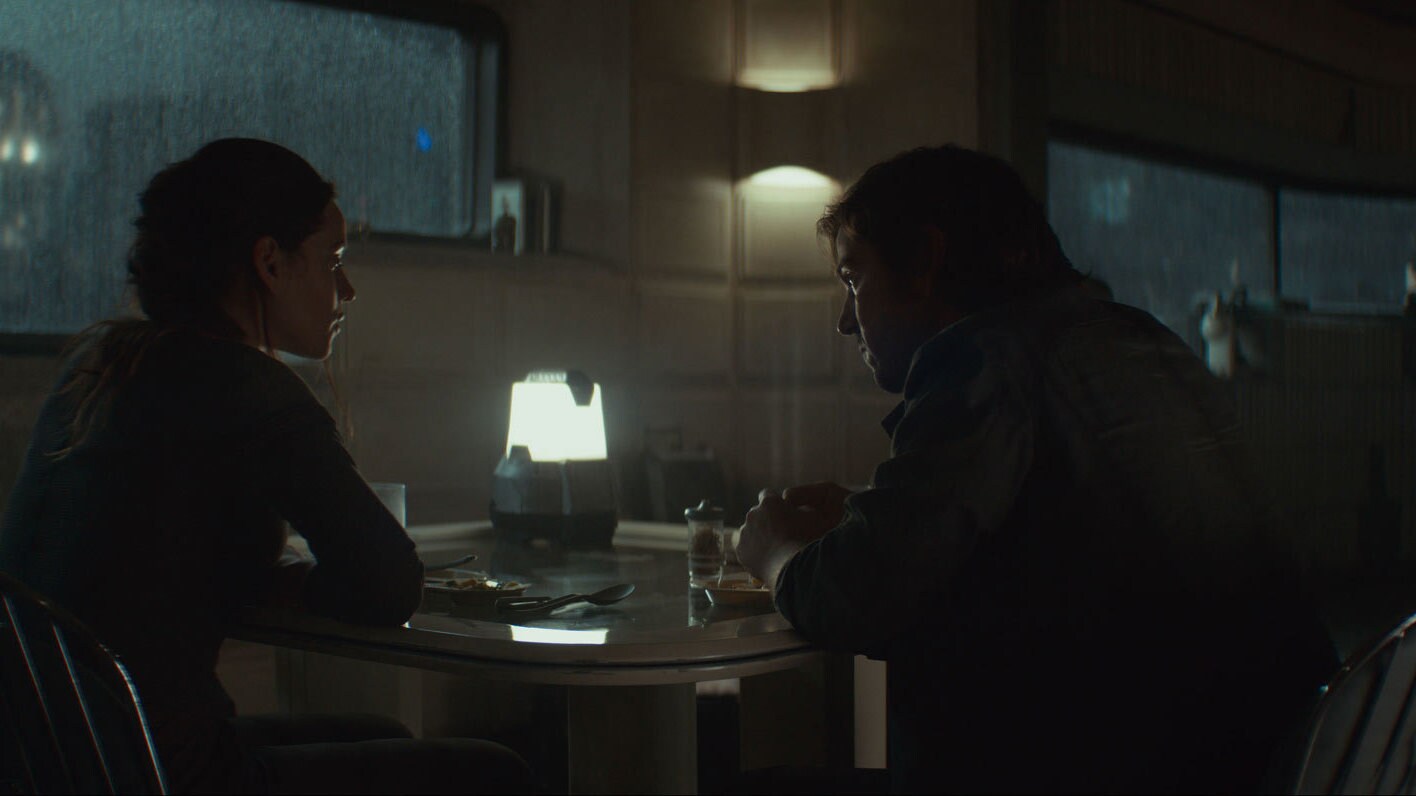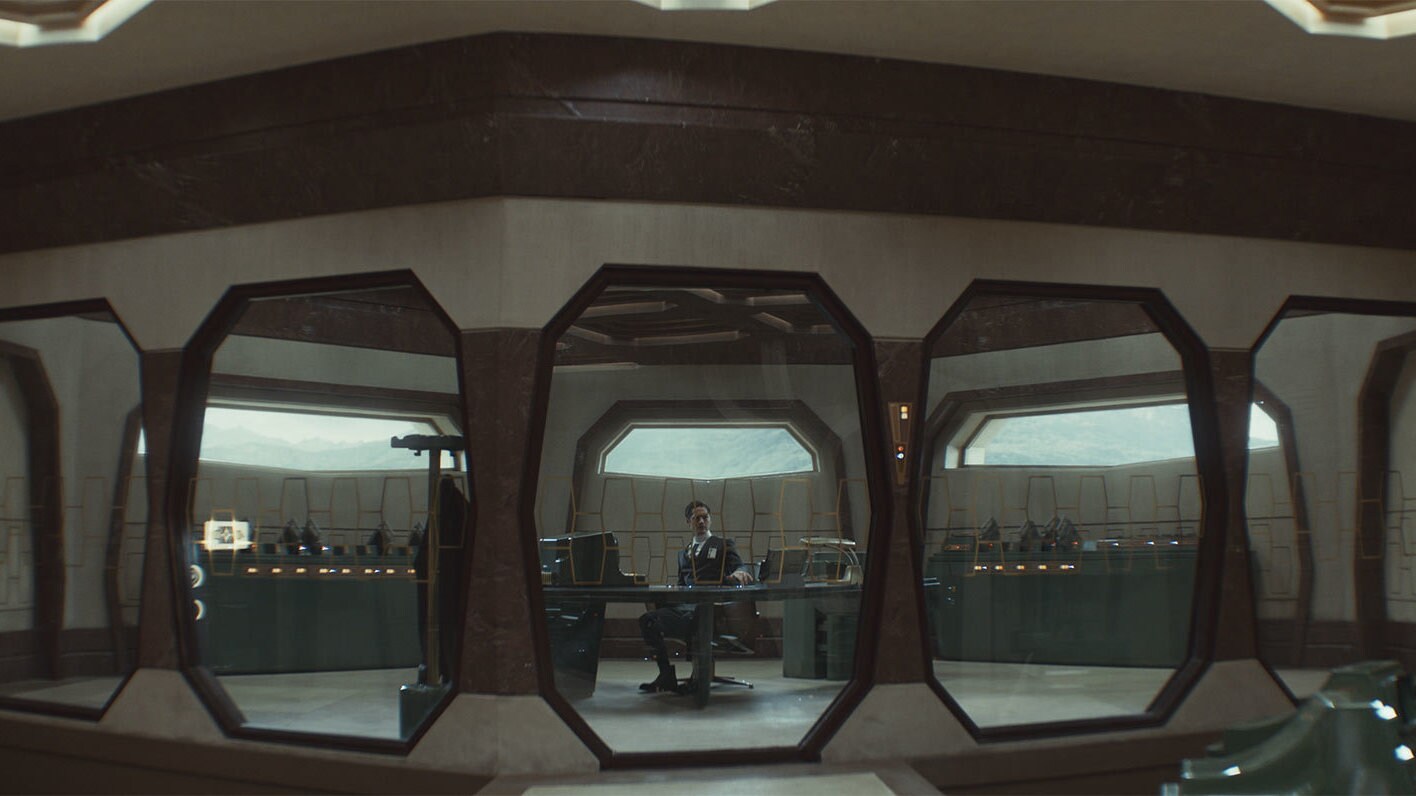A year after the trauma of Min-Rau, Cassian and Bix have uneasy peace on Coruscant
Andor has always had a heavy pour of spy thriller in it, part of which I’ve attributed to showrunner Tony Gilroy’s earlier work on the Jason Bourne franchise. In “Ever Been to Ghorman?”, the spy genre is in full swing as Cassian and Syril Karn both go undercover on Ghorman.
Cassian is hesitant to leave Bix as they’ve started to relax a little in Coruscant, where the density of the city keeps them safe. Even so, Cassian doesn’t let his guard down, avoiding areas with cameras since his face is known and growing frustrated when Bix returns to a bodega she frequented a month ago. As Bix says, trying to ease his tension, today “the mission is shopping.”
While Cassian’s struggles are outward, placing stress on his relationship with Bix, hers are internal. She can’t sleep, and the episode opens with her stalking through their apartment with a drawn blaster, following the ghost of her torturer from season 1. The trauma of being tortured by the Empire at the hands of Dedra Meero still haunts Bix. In this dream, her torturer confronts her about Cassian killing a young imperial pilot on their last mission.
When Bix can’t let it go, she accuses Cassian of making the choice to kill the young pilot because he’d seen her face, but Cassian insists it was necessary because he worked for the Empire. This moment is in nice juxtaposition to episode 1, where a low-level worker assists Cassian in stealing the TIE fighter. She accidentally looks at his face and apologizes because she was told not to, but he says it’s all right, and they have an uplifting moment of connection as they both risk their lives for a nascent resistance. In that case, with a supportive, vetted person, Cassian was willing to break the rules, but he has no tolerance for anyone supporting the Empire—which we see throughout the series as the body count rises.
Meanwhile, Syril is living his dream by working under his girlfriend, Dedra Meero, for the Imperial Security Bureau (ISB). In the last post, I know I didn’t touch on one of the best scenes between Syril and Dedra, but I’ll come back to the dinner scene with his mother when I talk about Syril’s character as a whole in episode 9. For now, Syril is playing spy and living the life. He’s been moved to the capital city of Ghorman, Palmo, where he works in an Imperial office overlooking the square where the Tarkin Massacre occurred. Every day, a small group of protestors call out against the Empire’s presence in building something—perhaps an armory—that will shadow the square.
Syril is cast as the sympathetic Imperial worker and plays his role when video-calling with his mother, Eedy Karn (with an amazingly cringey performance by Kathryn Hunter). She’s been overtaken by the propaganda machine utilized by the Empire to turn public opinion against the Ghor, and Syril tells her to watch something other than Imperial television (in a conversation all too familiar to most of us). The Ghorman Front—the relatively inexperienced and untested resistance on Ghorman—is listening in. They demonstrate their naivete by inviting Syril to a townhall and quickly bringing him into their group, even introducing them to their leader, the public-facing city councilor, Carro Rylanz (Richard Sammel).
While important to the plot, the townhall is also a beautiful feat of worldbuilding. As discussed by Reactor Magazine, the Ghor conlang sounds distinctly French, and primary speakers were played by French actors. Before I knew about the effort that went into the conlang, I was struck by how fluidly the actors spoke the language. It felt natural in a way conlang doesn’t always come across, especially during emotional scenes—and the townhall certainly has a lot of emotion as people yell at the council and make rude gestures, leading Lezine (Thierry Godard and my favorite Ghorman) to interrupt the meeting with his comments. The gestures, such as tapping the chest in addition to applause, are what add a lived-in feeling to this world and make the Ghor feel like a fully developed culture.
Of course, the connection to the French resistance during World War II is obvious, but like all of Andor’s historical storytelling beats, the series never becomes an allegory or parable. Instead, the Ghorman Front is a demonstration of early mistakes by those new to resistance, as they trust Syril too quickly, which we know will lead to the eventual destruction of Ghorman for kalkite to build the Death Star.
While some of the general conversation around the show is that the pacing isn’t as strong as the first season—or just too slow generally—I’ll take that for a depth of worldbuilding that not only develops the plot but deepens the show’s commitment to anti-imperialism and to demonstrating how anti-fascist action works. In many interviews, Tony Gilroy, as well as the cast, has talked about the level of detail that has gone into the show, whether it’s the quality of the costumes or the hand ritual from this episode that Bix and Cassian conducted. In an episode heavy with interpersonal conflict between Bix and Cassian, this moment of tender ritual is deeply moving and shows their dedication to each other. As Adria Arjona told The Hollywood Reporter: “But Diego slowly started doing this thing with his hand, and then I just followed in a way. It was really beautiful, and it was a moment of connection between two actors. […] It was so simple, but it had so much depth to it in the making of it and even the performing of it.”
I’ll take these moments of worldbuilding—from the space bodega to hand ritual—over a blaster fight any day, especially when such moments demonstrate the importance of relationships in the face of fascism. As critic and writer from France, John Berger, said about tenderness: “[Tenderness] is almost a defiant act of freedom.”
POSTED BY: Phoebe Wagner (she/they) is an author, editor, and academic writing and living at the intersection of speculative fiction and environmentalism.

